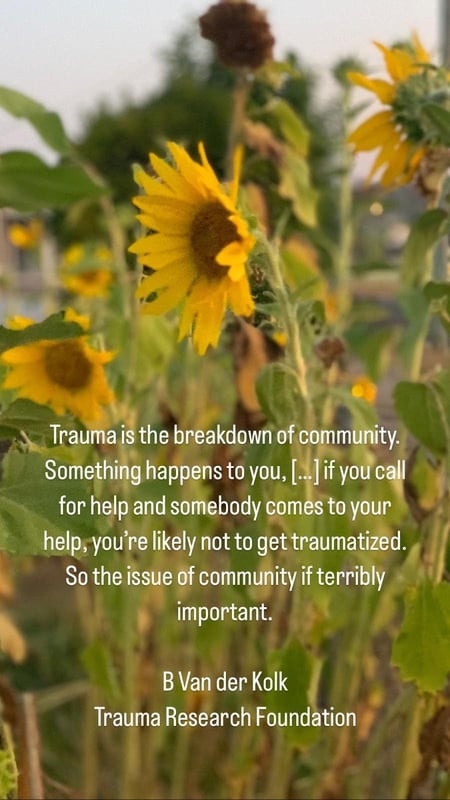Connection is essential to processing trauma

Trauma is the breakdown of community. Something happens to you, you cry out for help, nobody comes to your help. If you call for help and somebody comes to your help, you’re likely not to get traumatized. So the issue of community is terribly important. Feeling like you’re a member of the human race is terribly important.
Bessel Van der Kolk, Trauma Research Foundation
Psychologists and therapists agree that cultivating a sense of belonging and community is a point of difference between processing tragic events or being traumatized by them. For clinicians, this could explain why we often naturally debrief after an intense shift or even form strong friendships with colleagues. Being able to express emotions or frustration, or cry sometimes, is very healthy in the light of trauma theory.
Build a community
Finding support, and like-minded peers to acknowledge each others' emotions and give space to process events, contributes to more clarity and can give meaning to your own feelings. Community offers a safe space to exchange and understand, in a respectful and mindful manner, and process traumatic events we witness.
We wish to ask you, in your clinical experience have you come across a safe group, or are you offered a safe debriefing time and space on a regular basis? In the spirit of trauma-sensitive practice, if we are able to hold space for the person affected, and if we listen with compassion, it has the potential to be truly transformative.
Thriving
During the cycle of thriving and healing, we build resilience, we find strategies to process and release emotions trapped in the body, and we progress. We cultivate hope. We learn to regulate our nervous system. But it is together with other humans that we process trauma, not alone.
Therapy is done with someone... let's think about it. Who has made a positive impact in your life as a clinician? Who has helped you grow, gain perspective on a situation, and offered you a shoulder to cry on?
Let us know in the comments below. Join this forum and safe space for clinicians and let's start real honest conversations about overwhelm, stress, and trauma in healthcare.
This blog is managed by individuals to open conversations about the wellbeing of healthcare workers, and is not monitored 24/7. We are not a psychology service nor urgent care for mental health emergencies. The information is only suggestive, it does not constitute formal expert advice. Please contact your general physician or your emergency department if you require immediate assistance. If you experience feelings or emotional distress you cannot manage alone, please seek help immediately, either call 000 or LifeLine 13 11 14 (in Australia).
Join me for a free online Breathwork session.
Enter your details below and you'll receive a 15 minute Breathwork session via email. You'll also receive access to exclusive monthly sessions - for free.



